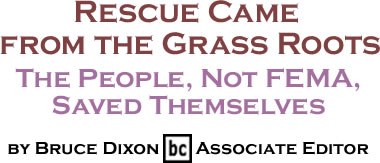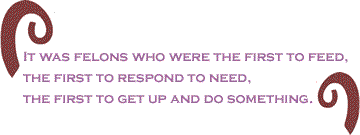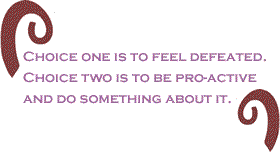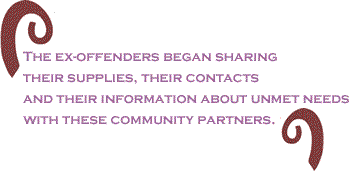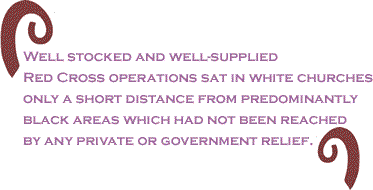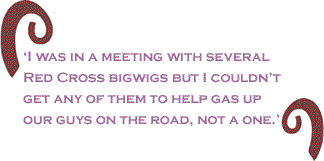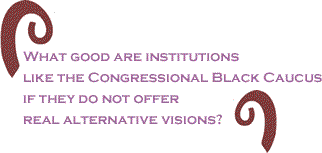
|
|||||||||||||||||||||
|
From her Atlanta home, former Gulf Coast resident Latosha Brown and a few friends watched the man-made catastrophe unfold in the wake Hurricane Katrina. "We kept expecting to see the National Guard, the government, the Red Cross, somebody to do something. The idea that our leaders would allow people to fend for themselves two, three, five days with no food, water, medicine or help from outside – we just couldn't get our minds around it. "People were dying by the hundreds in New Orleans, and more folks we knew in Mississippi, in Alabama were hurt, missing and homeless or hungry. You've got two choices when you see something like that. Choice one is to feel defeated. Choice two is to be pro-active and do something about it. There were about six of us in my living room at that moment, all movement vets. We called around to see what we could make happen ourselves. "The first folks to send a couple of vans of food and supplies was TOPS, The Ordinary Peoples Society, a prison ministry in Dothan AL founded and staffed by ex-offenders. They organized food from a food bank, pooled their money to get additional goods and moved it to Mobile where they connected with a second organization of formerly incarcerated brothers down there to distribute it while they went back to Dothan for more. That's why we tell everybody now that it was felons who were the first to feed, the first to respond to need, the first to get up and do something. They didn’t wait for permission or for a contract. That’s real leadership.” The Real Leaders Rev. Kenneth Glasgow of Dothan Alabama and Paul Robinson of Mobile each spent a decade in prison. Both are part of a network of black civic and religious organizations that have fought for years to restore the right to vote to over 200,000 former prisoners in Alabama, most of them African American men. Glasgow and his organization hustled food and got the first vans on the road southbound to the gulf. Jackson and his organization met the vans and guided them to where the need was greatest. “We started going into the projects,” said Glasgow. “We went to Orange Grove and other places, somewhere the water had reached second floor windows, but nobody had seen FEMA or the Red Cross. We just started targeting areas where nobody else was coming.”
The former prisoners found small and medium sized black churches in the affected area who also hadn't been contacted by the Red Cross or any government agency but who'd mobilized their own members to begin feeding their neighborhoods. The ex-offenders began sharing their supplies, their contacts and their information about unmet needs with these community partners. By the second food and water trip south, the former prisoners were bringing families out of flooded and devastated areas back to safety and temporary housing, and soon the ex-felons were driving in shifts with vans moving both ways around the clock. Abandoned by the Government Brown and her friends imagined that by their second or third trip south, local or federal officials, the National Guard or someone in authority would be on the scene to feed people, to evacuate the sick, homeless and injured, restore essential services, assess the damage and generally do what governments of modern and civilized societies are expected to do. But in Gulf Coast Alabama and Mississippi, just as in New Orleans, it didn’t happen. “When we realized this wouldn’t be over in a couple days, we hit the phones again,” Latosha Brown told BC. “We asked for help from community and civic organizations we’d worked with, from churches we knew, from businesses and individuals and doors just flew open. It was amazing. One friend was able to get $10,000 worth of food donated, but it sat there all morning because we had no way to move it. A brother in the community, a truck driver stepped up and volunteered to get it down to the Gulf Coast for gas money. Paul Robinson down in Mobile got us a warehouse to receive goods being sent, and somebody’s supervisor on the job lent a forklift and driver. We found more vans in other places, and on the fourth day our group in Selma working with a local church opened up a shelter for a hundred people. Every truck and van that carried supplies down brought families out on the way back, including a number of Cambodian and Vietnamese families…”
“The black churches tapped their own networks,” said Paul Robinson of One For Life in Mobile. “Donations, supplies and volunteers came from churches all over Mississippi and Alabama. We got help from churches in Minnesota, Maryland and Virginia that arrived in black neighborhoods before anybody from FEMA or the Red Cross. Still, even after the arrival of official help we kept finding pockets of mostly black people bypassed or ignored by FEMA and the Red Cross. This should have been no surprise. Much of the National Guard was in Iraq. FEMA never demanded that Red Cross officials leaders expand their personal network of contacts across the tracks into Black Biloxi, Black Mobile, Black Gulfport and Black Pascagoula. So well stocked and well-supplied Red Cross operations sat in white churches only a short distance from predominantly black areas which had not been reached by any private or government relief agency before black churches and black ex-offenders and black grassroots organizations took matters into their own hands. Ex-Offenders are First Responders “We didn’t get as much help from the Red Cross as we expected,” Latosha Brown told BC, “and at first we put it down to them just being overwhelmed. But the pattern we saw of them failing to notice the needs in our community when they were just so close, failing to partner with those on the ground doing work in those areas when they have no problem accepting donations from black people was really disturbing. “I flew down to Gulfport on my own dime, partly to meet with local Red Cross officials. It was a real disappointment to be in a place where all these supplies and resources were concentrated, and see them make very little effort to partner with their own neighbors, with black churches, with the formerly incarcerated brothers and others who were on the ground serving the neighborhoods where we knew the need was so great.
“I never answer my cell phone during meetings, but somehow the spirit told me I should answer it during this particular meeting, this one time. It was some of our people driving the vans. Three of our vans on the way north out of the flooded areas were loaded with evacuees, but no cash and about to run out of gas somewhere in Mississippi. They were calling me because they knew I might have a credit card. I was in a meeting with several Red Cross bigwigs but I couldn’t get any of them to help gas up our guys on the road, not a one. We got next to no help from the Red Cross that day. On the way out they offered us a couple cases of juicy juice and some overripe bananas. I wanted to cry.” Whether Brown cried that day or not, the coalition of churches, community organizations, business people, former prisoners and others engaged in grassroots relief effort soldiered on. By September 15th they had moved $100,000 worth of food and supplies to affected areas, gained access to eight buses, had evacuated over a thousand people and were helping supply and run four shelters. Through contacts with realtors and builders they were arranging temporary and permanent housing for families, and funneling volunteers from dozens of churches to affected areas to assist in cleanup. A week later, just before this article’s press time, SOS After Katrina had secured the cooperation of the National Medical Association, the premiere organization of African American physicians to provide medical services to some evacuees and persons in affected areas.
“We call ourselves SOS After Katrina” said Latosha Brown. “That stands for Saving Our Selves, cause if we don’t who will?” What is a Government for? Brown and the coalition of organizations that make up SOS Katrina know that taking care of citizens is still the responsibility of government, and they vow to stick around for the political fight to make that happen. But since it did not happen this time, they stepped up. The Red Cross did not fulfill its responsibility to serve the whole community. SOS After Katrina and the black church will continue to struggle with them – not against them, but with them, to help fix this too. Again, if we don’t fight to save ourselves, who will? The same Thursday night that BC interviewed Latosha Brown President Bush spoke to the nation from New Orleans. The president’s hypocritical lip service to the right of the city’s evacuated residents to return and to remain, was followed by a $50 billion dollar pledge and a wage of cost-plus, no-bid contracts to corrupt military contractors that included Halliburton and Bechtel. This, and the suspension of the 70 year old Davis-Bacon Act, allowing federal contractors to further lower the already low prevailing wages in the region are just the beginning. The good people at OMB Watch put it like this:
If the Heritage Foundation and the Bush Administration have their way the Gulf states will be the scene of more crimes against public safety, health and prosperity in the months and years to come. They are not the least bit ashamed to tell us so, and some of the first legislative proposals along this line were submitted September 15.
We have seen grassroots black leaders in our churches and community organizations answer the call to pull together a people’s relief effort in response to the government’s failure to plan and provide for its citizens in crisis. The question now is whether members of our established black political leadership are willing to relentlessly expose the root causes of these failures and make sure they never happen again. What will black political leadership do to protect us and the nation from Bush’s cynical “Gulf Coast Opportunity Zone”? What good are institutions like the Congressional Black Caucus if they do not offer real alternative visions, hold public hearings, educate the public, and campaign for concrete remedies. Unity of the caucus would be nice, but clarity and an opposing vision of what the Gulf coast must look like, what America must look like are far more important at this time. The grassroots leadership has stepped up. Now it’s time for members of the Congressional Black Caucus to find their voices. So far, the contrast between the can-do spirit of our churches and community organizations, and yes, our organized ex-offenders and what we hear from most of our black faces in high places is glaring, obvious and a little sad. The web site of SOS After Katrina is www.sosafterkatrina.org Some of the organizations included in SOS After Katrina are:
Bruce Dixon can be reached at [email protected]. |
Your comments are always welcome. Visit the Contact Us page to send e-Mail or Feedback or Click here to send e-Mail to [email protected] e-Mail re-print notice
If you send us an e-Mail message we may publish all or part of it, unless you tell us it is not for publication. You may also request that we withhold your name. Thank you very much for your readership. |
| September 22 2005 Issue 151 |
|||||||||
|
|||||||||
|
|
|||||||||
| Printer Friendly Version in PDF format. Download free Adobe Reader. | |||||||||
 |
|||||||||
 |
|||||||||
| |
|||||||||
| |
|||||||||





















